 W
WThe Battle of Amphipolis was fought in 422 BC during the Second Peloponnesian War between Athens and Sparta. It was the culmination of events that began in 424 BC with the capture of Amphipolis by the Spartans.
 W
WThe Battle of Coronea in 394 BC, also Battle of Coroneia, was a battle in the Corinthian War, in which the Spartans and their allies under King Agesilaus II defeated a force of Thebans and Argives that was attempting to block their march back into the Peloponnese.
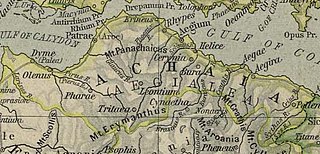 W
WThe Battle of Dyme or Dymae was a battle that was fought by the Achaean League under the command of their Strategos, Hyperbatas, and a Spartan army under the command of King Cleomenes III, and was part of the Cleomenean War. The battle took in place near Dyme in north-west Achaea and was fought in 226 BC.
 W
WThe Battle of the Fetters was an engagement between Sparta and Arcadia c. 550 BCE, in which the Arcadians defeated the Spartans.
 W
WThe Battle of Haliartus was fought in 395 BC between Sparta and Thebes. The Thebans defeated a Spartan force attempting to seize the town of Haliartus, killing the Spartan leader Lysander. The battle marked the start of the Corinthian War, which continued until 387 BC.
 W
WThe Battle of Lechaeum was an Athenian victory in the Corinthian War. In the battle, the Athenian general Iphicrates took advantage of the fact that a Spartan hoplite regiment operating near Corinth was moving in the open without the protection of any missile throwing troops. He decided to ambush it with his force of javelin throwers, or peltasts. By launching repeated hit-and-run attacks against the Spartan formation, Iphicrates and his men were able to wear the Spartans down, eventually routing them and killing just under half. This marked one of the first occasions in Greek military history on which a force of peltasts had defeated a force of hoplites.
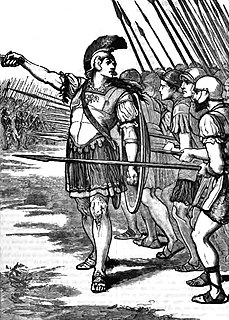 W
WThe Battle of Leuctra was a battle fought on 6 July 371 BC between the Boeotians led by the Thebans, and the Spartans along with their allies amidst the post-Corinthian War conflict. The battle took place in the neighbourhood of Leuctra, a village in Boeotia in the territory of Thespiae. The Theban victory shattered Sparta's immense influence over the Greek peninsula, which Sparta had gained with its victory in the Peloponnesian War a generation earlier.
 W
WThe Battle of Lyncestis/Lyncus took place in 423 BC between the allied forces of the Lyncestians and Illyrians against those of the Spartans and Macedonians. The battle was part of the wider Peloponnesian Wars. Before Athens suffered defeat at Delium in 424 BC, Sparta had sent an expedition under Brasidas to assist Perdiccas II of Macedonia and other opponents of Athens. At first Sparta avoided involvement in Macedon's war with Arrhabaeus, but in 423 BC they joined an expedition which ended with retreat by the Macedonians and a brilliantly contrived escape of the Spartans.
 W
WThe Battle of Mantinea was fought in 207 BC between Sparta under the Tyrant Machanidas, as part of the Aetolian League, and the Achaean League whose forces were led by Philopoemen. Both sides were supplemented by mercenaries. It was the major land battle in Greece of the First Macedonian War, which had occurred due to Macedonian alliance with Carthage in the aftermath of Hannibal's victory at the Battle of Cannae in the Second Punic War.
 W
WThe Second Battle of Mantinea was fought on July 4, 362 BC between the Thebans, led by Epaminondas and supported by the Arcadians and the Boeotian league against the Spartans, led by King Agesilaus II and supported by the Eleans, Athenians, and Mantineans. The battle was to determine which of the two alliances would dominate Greece. However, the death of Epaminondas and his intended successors coupled with the impact on the Spartans of yet another defeat weakened both alliances, and paved the way for Macedonian conquest led by Philip II of Macedon.
 W
WThe First Battle of Mantinea of 418 BC was a significant engagement in the Peloponnesian War. Sparta and its allies defeated an army led by Argos and Athens.
 W
WThe Battle of Megalopolis was fought in 331 BC between Spartan led forces and Macedonia. Alexander's regent Antipater led the Macedonians to victory over King Agis III.
 W
WThe Battle of Mount Lycaeum was a battle fought between Sparta led by Cleomenes III and the Achaean League commanded by Aratus. It was the first major battle of the Cleomenean War. The battle occurred at Mount Lycaeum on the border of Elis and Arcadia and ended in a Spartan victory.
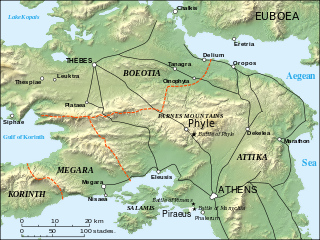 W
WThe Battle of Munychia was fought between Athenians exiled by the oligarchic government of the Thirty Tyrants and the forces of that government, supported by a Spartan garrison. In the battle, a substantially superior force composed of the Spartan garrison of Athens and the army of the oligarchic government attacked a hill in Piraeus which had been seized by 1,000 exiles under Thrasybulus, but was defeated. After this defeat, the Thirty Tyrants were forced to flee to Eleusis.
 W
WThe Battle of Nemea, also known in ancient Athens as the Battle of Corinth, was a battle in the Corinthian War, between Sparta and the coalition of Argos, Athens, Corinth, and Thebes. The battle was fought in Corinthian territory, at the dry bed of the Nemea River. The battle was a decisive Spartan victory, which, coupled with the Battle of Coronea later in the same year, gave Sparta the advantage in the early fighting on the Greek mainland.
 W
WThe Battle of Olpae was a battle of the Peloponnesian War in 426 BC, between armies led by Athens and Sparta.
 W
WThe Battle of Phyle was fought between Athenian exiles who were seeking to restore democracy to Athens and a Spartan garrison trying to protect the oligarchic Thirty Tyrants. In the battle, 700 Athenian exiles under Thrasybulus decisively defeated the Spartans and their Athenian cavalry in a dawn ambush.
 W
WThe Battle of Piraeus was fought in 403 BC between Athenian exiles who had defeated the government of the Thirty Tyrants and occupied Piraeus and a Spartan force sent to combat them. In the battle, the Spartans narrowly defeated the exiles, with both sides suffering appreciable casualties. After the battle, Pausanias arranged a settlement between the two parties which allowed the reestablishment of democratic government in Athens.
 W
WThe Battle of Plataea was the final land battle during the second Persian invasion of Greece. It took place in 479 BC near the city of Plataea in Boeotia, and was fought between an alliance of the Greek city-states, and the Persian Empire of Xerxes I.
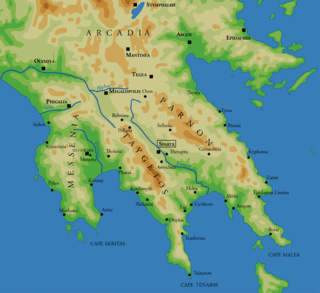 W
WThe Battle of Sellasia took place during the summer of 222 BC between Macedon and the Achaean League, led by Antigonus III Doson, and Sparta under the command of King Cleomenes III. The battle was fought at Sellasia on the northern frontier of Laconia and ended in a Macedonian-Achaean victory.
 W
WThe Sicilian Expedition was an Athenian military expedition to Sicily, which took place from 415–413 BC during the Peloponnesian War between Athens on one side and Sparta, Syracuse and Corinth on the other. The expedition ended in a devastating defeat for the Athenian forces, severely impacting Athens.
 W
WThe siege of Gythium was fought in 195 BC between Sparta and the coalition of Rome, Rhodes, the Achaean League, and Pergamum. As the port of Gythium was an important Spartan base, the allies decided to capture it before they advanced inland to Sparta. The Romans and the Achaeans were joined outside the city by the Pergamese and Rhodian fleets. The Spartans held out, but one of the joint commanders, Dexagoridas, decided to surrender the city to the Roman legate. When Gorgopas, the other commander, found out, he killed Dexagoridas and took sole command of the city. After Dexagoridas' murder, the Spartans held out more vigorously. However, Titus Quinctius Flamininus of the allied forces arrived with 4,000 more men and the Spartans decided to surrender the city on the condition that the garrison could leave unharmed. The result of this siege forced Nabis, the tyrant of Sparta, to abandon the surrounding land and withdraw to the city of Sparta. Later that year, Sparta capitulated to the allies.
 W
WThe siege of Mantinea occurred in 385 BC, and resulted in a victory of the Spartans over the city of Mantinea, which was defeated and dismembered. On this occasion, Epaminondas, king of the Thebans, then fighting on the side of the Spartans, famously rescued his fellow Theban Pelopidas.
 W
WThe siege of Sparta took place in 272 BC and was a battle fought between Epirus, led by King Pyrrhus, and an alliance consisting of Sparta, under the command of King Areus I and his heir Acrotatus, and Macedon. The battle was fought at Sparta and ended in a Spartan-Macedonian victory.
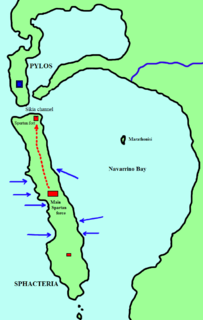 W
WThe Battle of Sphacteria was a land battle of the Peloponnesian War, fought in 425 BC between Athens and Sparta. Following the Battle of Pylos and subsequent peace negotiations, which failed, a number of Spartans were stranded on the island of Sphacteria. An Athenian force under Cleon and Demosthenes attacked and forced them to surrender.
 W
WThe Battle of Tegyra was an ancient Greek battle between Theban and Spartan hoplite forces. In the battle, a Theban army under Pelopidas was challenged by a substantially larger Spartan force while retreating from an abortive attack on Orchomenus, but successfully attacked and routed the Spartans. The battle marked the first occasion in the historical record in which a Spartan force had been defeated by a numerically inferior enemy in a set battle.